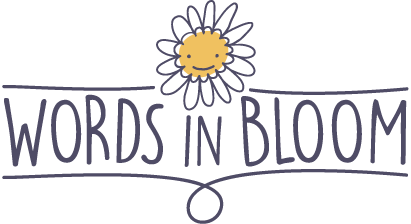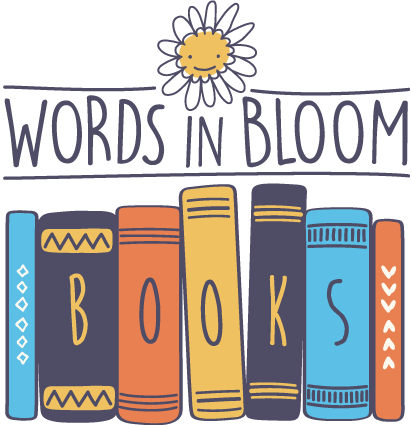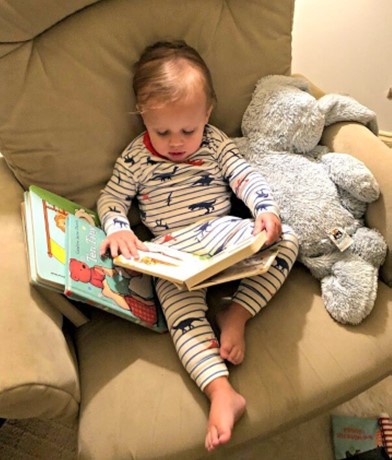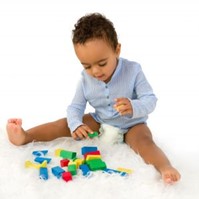
A Quick Guide to Your Toddler’s Speech and Language Development – 12 to 18 Months
 Speech and Language Milestones
Speech and Language Milestones
By 18 months, your toddler:
- reaches or points to something they want
- understands far more words than they say
- understands simple sentences, questions, and requests, for example, “Find your shoes.”
- uses their own name to refer to themself
- points to several body parts when asked
- says at least 20 words consistently
- makes at least four different consonant sounds (/p/, /b/, /m/, /n/, /d/, /t/, /w/, /h/)
- enjoys looking at books and being read to and points to pictures using one finger
- shakes their head for “no”
- follows simple instructions (“Show me the truck.”)
- responds to simple questions (“Where is daddy?” or “What do you want?”)
- asks for things they want using sounds or words
- looks at your face when talking to you
A referral to the Words in Bloom program may be needed if your child is not meeting most of these milestones.

Building Blocks for Developing Your Toddler’s Speech and Language Skills
- Talk to your toddler at their physical level. It makes it easier to imitate their actions and words and lets them know that you are interested in what they are doing or saying. They also can see how you say your words this way.
- Use daily routines like mealtime and bath time to introduce new words and practice familiar words like “cup,” “spoon,” “apple,” “wash,” and “dry.”
- Talk about what you are doing using short sentences. These should include a variety of object and people names (nouns) as well as action words (verbs) and words that describe (adjectives).
- Give your toddler a chance to answer or take a turn. Wait at least 5 seconds before taking another turn. This lets your toddler know that conversations are two-way interactions.
- Use the same words in a new way. This will show your toddler how to start combining words like “my ball” and “roll the ball.”
- Name body parts, toys, or objects that your toddler points to. See if your toddler looks back and forth between you and the object or body part you name (joint attention).
- Read and look at books together often.
- Create a personalized picture book for your toddler.
The Importance of Play
Play is the most enjoyable way to promote your toddler’s speech and language skills.
- Toddlers like to play with toys that make sounds, play music, or do things (like open and close).
- Get down on the floor with your toddler and get a toy that you can play with too.
- Be silly - stacking cups make great hats, make musical instruments out of pots and pans.
- Every time your toddler looks at something, brings you something, or shows interest in something, give him the appropriate word. He will only learn new words if he hears them often.
- When playing with toys (vehicles for instance), give the appropriate name for each vehicle (firetruck, helicopter, van, sailboat, dump truck, tractor, camper, etc.).
BOOKS
Bes t Book Types:
t Book Types:
- Board books
- Lift the flap books
- Books with mirrors or textures
- Homemade books
- Books with bright pictures and few words
Observe Your Child:
- Try to figure out what interests your toddler most about books - is it the colourful pictures, fun sounds, or what you do with the book? This will help in offering choices to your toddler.
- Take a trip to the library or local bookstore and see what books your toddler chooses.
- Is your toddler starting to point to pictures that you name?
Opt to Join In:
- Let your toddler take the first turn with the book.
- Name animals and vehicles in books and let your toddler hear the fun sounds they make (“The cow says MOO” or “Choo-choo goes the train”).
- Introduce new vocabulary that goes with the pictures.
Keep Having Fun:
- Use an animated and playful voice.
- Let your toddler be in charge of the book (it’s okay if they flip through the pages).
- Read a favourite book over and over again.
Some Suggestions:
- My First Words by Priddy Books
- Toes, Ears and Nose by Marion Dane Bauer
- The Wheels on the Bus by Penny Dann
- Whose House is This? by Charles Reasoner
Did You Know?
- Kids love it when you get down to their level to talk and play with them.
- Singing songs or reciting rhymes like “The Itsy Bitsy Spider” or “Teddy Bear, Teddy Bear” are wonderful ways to take turns with your toddler and to teach them new actions and words.
- Your toddler is constantly growing and discovering new things around them. Talk about what interests them to help them use words to label what they see.
 Frequently Asked Questions
Frequently Asked Questions
Q: My family members use “baby talk” when talking to my toddler. Is this a good idea?
A: It is best to use real words and simple, grammatically correct phrases and sentences with your toddler. But do vary your voice and facial expressions when speaking to your toddler to increase their attention to what you are saying.
Q: My doctor said my daughter will talk when she’s ready. Is there something I can do to help her along with her development?
A: Each child is unique and will reach milestones at her own pace; but some children may have difficulties with development and might need extra help from a specialist. Ask you child’s doctor to refer you to your local Preschool Speech and Language Program or refer your child for an assessment yourself (no need for medical referral).
Q: Should I be concerned if my toddler doesn’t look at me or respond to his name?
A: Speak to your healthcare provider if your toddler does not look at you, respond to their name, or try to imitate the things you say or do, or if you have any concerns about your toddler’s development. It’s never too early to get help!
If you suspect your child is having difficulty communicating, don’t wait! Follow your instincts. Friendly, confidential help is only a call away.
Contact Words in Bloom by calling the EOHU at 613-933-1375 or at 1-800-267-7120.

